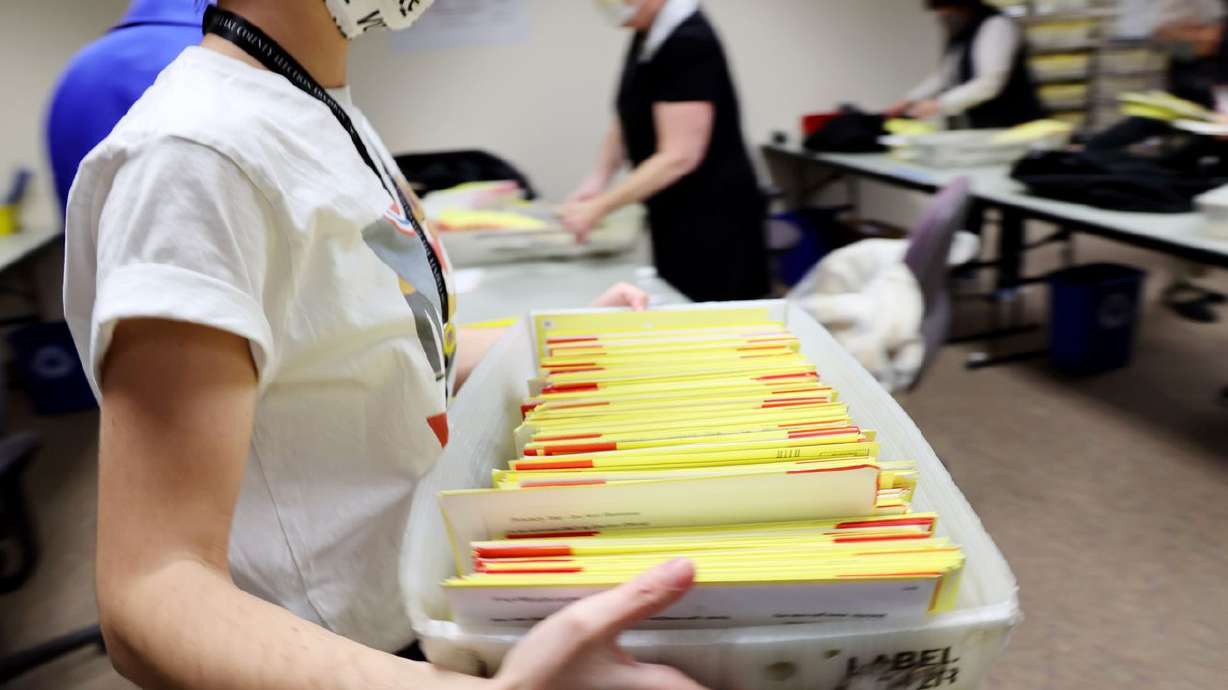Estimated read time: 3-4 minutes
This archived news story is available only for your personal, non-commercial use. Information in the story may be outdated or superseded by additional information. Reading or replaying the story in its archived form does not constitute a republication of the story.
SALT LAKE CITY — Lawmakers have proposed a variety of changes to improve elections in Utah, two of which have received broad support — including from the state's highest election official.
Lt. Gov. Deidre Henderson spoke in favor of a bill to modify access for poll watchers on Tuesday, after lending her support to a separate election security effort last week.
Henderson said her office worked with bill sponsor Rep. Mark Strong, R-Bluffdale, to craft HB387, which would require that poll watchers be allowed to stand within 6 feet to observe the counting of votes and require that county clerks regularly post running totals of ballots received and processed. Strong said the provision would standardize reporting practices across the state and improve transparency.
He likened the bill to wearing "a belt and suspenders," by addressing multiple areas of transparency in elections.
"If you wear a belt and suspenders, you're really not going to lose your pants," Strong said. "I recommend you only wear one or the other from a fashion standpoint, but from an election integrity standpoint, we want to put both a belt and suspenders on this bill."
Prior to an election, the bill would require that county clerks release a daily total of ballots in their possession, as well as the number that have been processed or are in process.
During the counting process, counties would be required to release a running total of ballots, including those that have been received, rejected, are awaiting processing, and are awaiting adjudication or duplication. Large counties that count ballots over the weekend would be required to release updated numbers every Monday, Wednesday and Friday, while others would only report Wednesday and Friday.
Strong said the bill brings the counting of votes in line with other government functions — such as open meetings and hearings — which require advanced public notice. Strong's bill stipulates that schedules be posted three days in advance, with any changes announced at least 24 hours in advance.
An earlier version of the bill addressed the date by which ballots must be postmarked in order to be counted, but Strong removed that language because he didn't see the change as "turning the needle." Ballots will still need to be postmarked the day before the election.
After being recommended by the House Government Operations Committee on Tuesday, HB387 will go to the full House for consideration.
Last week, the House also advanced HB313 to require voter IDs for mail-in ballots and require video surveillance for unattended ballot drop boxes. It also "clarifies that it is unlawful to vote in the same election in Utah and outside of Utah," and requires that ballots be mailed from within the state — in an effort to prevent what bill sponsor Rep. Jon Hawkins, R-Pleasant Grove, called "nefarious activity."
"In our last election, it really didn't matter who you voted for, we all kind of lost. And what we lost was voter confidence in our elections," Hawkins told House colleagues last Thursday.
"There's a lot of people in this room who care deeply ... about the security of our elections," Henderson said during the committee hearing on the bill. "This bill improves our systems and processes."
The original bill also included more stringent procedures around voter IDs and would have made it optional for election officers to provide ballot drop boxes for voters.
In a YouTube video, Nikila Venugopal, the director of campaigns for the ACLU of Utah, said the ID requirements and other provisions in the original bill would "throw cold water on our growing participation trends in Utah." She said the current version "is in a better place now," but she wouldn't go as far as to say the ACLU supports it.
"We're kind of just in a watching and monitoring pattern right now," Venugopal said, adding that the ACLU had worked with Hawkins to resolve many of their original concerns. "We're ... making sure that what actually ends up passing doesn't, in fact, place big barriers in front of a lot of voters."
HB313 passed the House 65-8 last Thursday.









